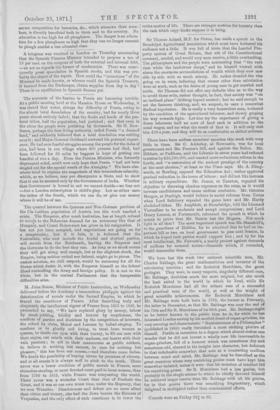M. Jules Simon, Minister of Public Instruction, on Wednesday 'delivered
before the Academy a tremendous philippic against the 'deterioration of morals under the Second Empire, to which ho traced the overthrow of France. After describing truly and 'eloquently the intellectual vigour of France from 1815 to 1848, he proceeded to say, " We have replaced glory by money, labour by stook-jobbing, fidelity and honour by scepticisms, the 'conflicts of parties and doctrines by the competition of interests, the school by clubs, Mehul and Lesueur by ballad-singing. To condone or to glorify evil living, to treat loose women as queens, to dazzle our eyes with their luxury, to fill our ears with their orgies, our minds with their madness, our hearts with their vain passions ; to aid in their manoeuvres as public robbers, to believe in nothing but success, to care for nothing but p 1 e as u r e , " this has been our course,—and therefore came Sedan. We doubt the possibility of buying virtue by promises of victory, and at all events it is always well to stick to the truth. There never was a lower condition of public morals in France, more shameless stealing, or more devoted court paid to loose women, than from 1796 to 1815, while France was conquering the world. There never was a wickeder Court than that of Frederic the Great, and it was at our own worst time, under the Regency, that we won Waterloo. Dissoluteness and defeat are no more allied than virtue and victory, else had the Jews beaten the Romans of Vespasian, and the only effect of such assertions is to lower the
entire motive of life. There are stronger motives for honesty than the cash which copy-books suppose it to bring.


































 Previous page
Previous page